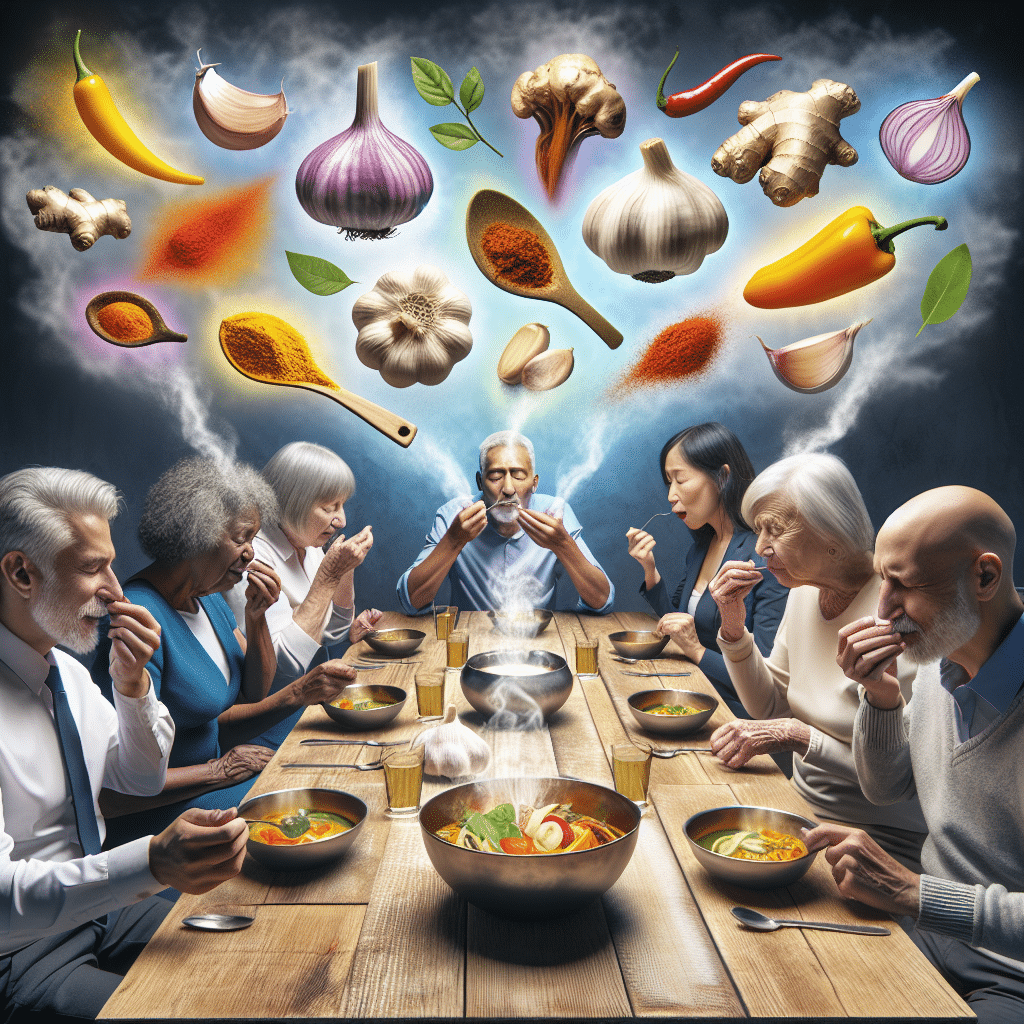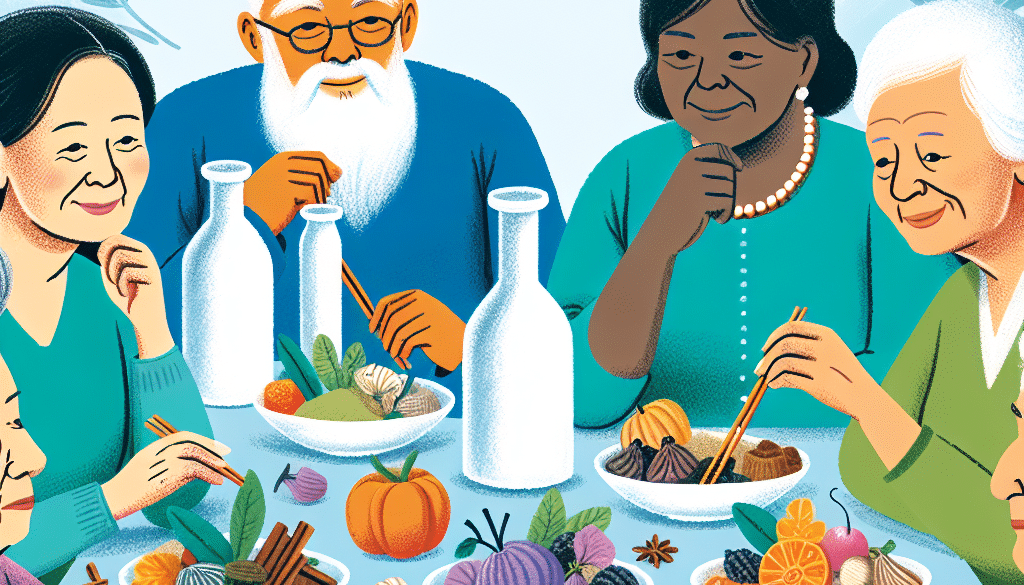Can Strong Flavors and Aromas Help Ageing Populations Overcome Frailty?
-
Table of Contents
- Strong Flavors and Aromas: Aiding Frailty in Ageing Populations
- The Link Between Sensory Perception and Nutrition in the Elderly
- Research on Sensory Enhancement and Dietary Intake
- Practical Applications in Care Settings
- Barriers to Sensory Enhancement in Elderly Nutrition
- Future Directions in Research and Practice
- Conclusion: Sensory Enhancement as a Tool Against Frailty
- ETChem’s Protein Products: Supporting Elderly Nutrition
Strong Flavors and Aromas: Aiding Frailty in Ageing Populations

As the global population ages, the challenge of maintaining health and quality of life in the elderly becomes increasingly important. Frailty, a common condition among the aging, is characterized by decreased strength, endurance, and physiological function, which increases an individual’s vulnerability to dependency and mortality. One of the lesser-known strategies to combat frailty involves the use of strong flavors and aromas in nutrition. This article explores the potential of sensory enhancement in food to improve dietary intake and overall well-being in older adults.
The Link Between Sensory Perception and Nutrition in the Elderly
It is well-documented that sensory perceptions, including taste and smell, decline with age. This can lead to a decrease in appetite and food intake, contributing to nutritional deficiencies and exacerbating frailty. The use of strong flavors and aromas may stimulate appetite and enhance the eating experience, encouraging better nutrition among the elderly.
- Age-related changes in taste and smell
- Impact on appetite and food preferences
- Consequences for nutritional status and frailty
Research on Sensory Enhancement and Dietary Intake
Several studies have investigated the role of sensory enhancement in improving dietary intake among older adults. For instance, a study published in the “Journal of Food Science” found that enhancing the flavor of foods led to an increase in food consumption in older adults. Similarly, research in “The American Journal of Clinical Nutrition” reported that aroma enhancement could improve the palatability of meals, leading to better energy intake.
- Case studies on flavor enhancement
- Statistical evidence supporting aroma enhancement
- Examples of successful interventions
Practical Applications in Care Settings
In care homes and hospitals, where many elderly individuals may experience frailty, the implementation of strong flavors and aromas in meal preparation can be particularly beneficial. For example, the use of herbs, spices, and aromatic seasonings can make meals more appealing and may help overcome the blandness often associated with institutional food.
- Strategies for enhancing meal flavors in care settings
- Case studies from hospitals and nursing homes
- Challenges and considerations for implementation
Barriers to Sensory Enhancement in Elderly Nutrition
Despite the potential benefits, there are barriers to the widespread adoption of sensory enhancement in elderly nutrition. These include individual differences in taste preferences, dietary restrictions, and the need for careful consideration of flavor and aroma combinations that are both appealing and healthful.
- Individual variability in sensory preferences
- Dietary restrictions and health considerations
- Developing universally appealing flavor profiles
Future Directions in Research and Practice
Further research is needed to optimize sensory enhancement strategies for the elderly and to understand the long-term effects on health outcomes. Additionally, there is a need for collaboration between chefs, nutritionists, and healthcare providers to create tailored solutions that address the specific needs of the aging population.
- Areas for future research
- The role of interdisciplinary collaboration
- Innovative approaches to sensory enhancement
Conclusion: Sensory Enhancement as a Tool Against Frailty
In conclusion, strong flavors and aromas offer a promising avenue to combat frailty in aging populations by improving dietary intake and enjoyment of food. While challenges exist, the potential benefits for health and quality of life make this an important area for further exploration and application. By understanding and leveraging the power of the senses, we can create more effective nutritional strategies to support the well-being of our elderly.
ETChem’s Protein Products: Supporting Elderly Nutrition
ETChem’s range of high-quality protein products, including various types of collagen, can play a vital role in enhancing the nutrition of the elderly. Their neutral taste and instant solubility make them an excellent addition to a variety of foods and beverages, helping to ensure that aging populations receive the protein necessary to combat frailty and maintain muscle mass.
About ETChem:
ETChem, a reputable Chinese Collagen factory manufacturer and supplier, is renowned for producing, stocking, exporting, and delivering the highest quality collagens. They include marine collagen, fish collagen, bovine collagen, chicken collagen, type I collagen, type II collagen and type III collagen etc. Their offerings, characterized by a neutral taste, instant solubility attributes, cater to a diverse range of industries. They serve nutraceutical, pharmaceutical, cosmeceutical, veterinary, as well as food and beverage finished product distributors, traders, and manufacturers across Europe, USA, Canada, Australia, Thailand, Japan, Korea, Brazil, and Chile, among others.
ETChem specialization includes exporting and delivering tailor-made collagen powder and finished collagen nutritional supplements. Their extensive product range covers sectors like Food and Beverage, Sports Nutrition, Weight Management, Dietary Supplements, Health and Wellness Products, ensuring comprehensive solutions to meet all your protein needs.
As a trusted company by leading global food and beverage brands and Fortune 500 companies, ETChem reinforces China’s reputation in the global arena. For more information or to sample their products, please contact them and email karen(at)et-chem.com today.




